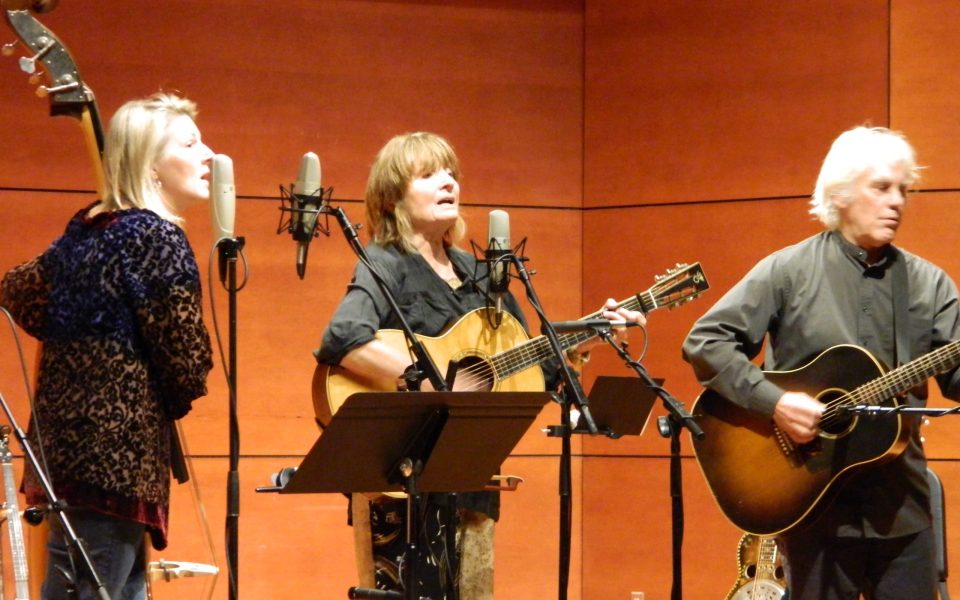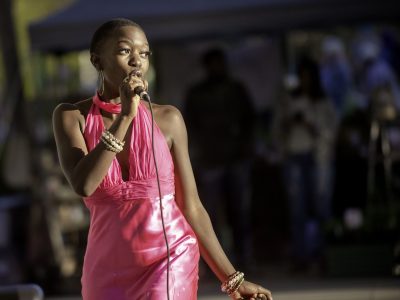by Jordan Green
Alice Gerrard and Hazel Dickens put together a repertoire for the Southern Folk Cultural Revival Project in the late ’60s, they sought songs that would resonate with the experience of people in eastern Kentucky and other parts of the rural Appalachian Coal Belt where they would be performing.
They visited a friend, Dick Spottswood, who pulled out an old 78 of a song called “Mining Camp Blues” recorded by a black singer named Trixie Smith in 1925. The name of Smith’s band, Her Down Home Syncopaters, only whet the appetites of the two socially conscious archivists. Smith’s mournful vocal suggested a blues singer like Bessie Smith, and the shuffling rhythm of the horn section underscored the dread and sorrow in the lyrics. “Many times I wondered when they took my daddy down,” Smith sang, as a reminder of the role that blacks have historically played in the dangerous work of coal-mining that rings across the decades. “Will he come back to me, will they leave him in the ground?”
Gerrard noted with delight during her Jan. 9 concert at Brindle Recital Hall on the campus of UNCG: “Louis Armstrong played cornet on the recording!”
Hazel & Alice’s recording of “Mining Camp Blues” is included on the pioneering bluegrass duo’s self-titled 1973 album, a collection of songs about hazardous labor, loneliness, homesickness, prison and domestic abuse that is as vivid and gut-punching as any recordings by the Carter Family. The Carters’ “Hello Stranger” is in fact part of the masterfully curated collection.
Dickens and Gerrard split professionally in the ’70s, and Dickens died in 2011 at the age of 75 after a fruitful solo career. Gerrard also continued to collect and write songs, and to perform and record while also founding the Old-Time Herald in Durham. Now at the age of 80, she is experiencing an improbable creative renaissance.
With Laurelyn Dossett on standup bass, Scott Manring on dobro, Barbara “Tolly” Tollefson on fiddle and Terri McMurray on banjo joining her onstage at UNCG, the session was like many of which Gerrard has been a participant over the past six decades. A group of friends, each keen to soak up the music and give something of value back to it. An elder giving instruction. Ultimately, an opportunity to share good company, and a good time.
“I start it,” Gerrard said from the stage, “and you guys come in… at some point.”
“Did you guys get that?” Dossett quipped for the benefit of the audience.
Gerrard kicked off the first few bars of the song on an acoustic guitar, a sequence of bass notes played in a blues walk-down style that answered back with a trebly conclusion. And then as her voice rang out — clear, strong and palpably weighted with sorrow — “Once I had a daddy, and he worked down in a hole…” — the band fell in, at times haltingly and then with gathering confidence, cohesion and emotional force. The moment captured the beauty of a group of musicians discovering their united abilities and voice.
The first in a series of concerts presented by Blue Ridge Music Center and 88.5 FM WFDD, the Across the Blue Ridge: Old Sounds, New Trails Concert Tour will traverse the region with stops in Mount Airy, West Jefferson and Winston-Salem over the next several weeks, with a rotating slate of featured performers. As host, former WFDD and NPR anchor Paul Brown narrated the history of old-time music, with his band the Piedmont Pals, including McMurray and banjo player Craig Smith, providing a musical demonstration. Rich Hartness, who performed the second set with Tollefson and his daughter, Joanna, played a similar role, as did Gerrard in her headlining set. They explained the history of the music, how it came from Ireland, English parlor songs, the African banjo and the blues. And they told stories about pilgrimages to fiddler conventions to learn the old songs from heroes like Tommy Jarrell and Luther Davis.
The reverence for tradition imbued in old-time music can sometimes make it feel like a museum piece stripped of breath, personal agency and tangible experience. And no wonder: Both Brown and Gerrard fondly reminisced about Davis striking them with a fiddle bow when they didn’t play the tunes right. But Gerrard’s career is a testament to the duality of tradition and innovation in great music — the commitment to scour obscure pockets of the world for songs and styles at risk of extinction, and then staking her own sensibility and emotional investment to make something new and revelatory.
Introducing a song inspired by an abandoned log cabin with broken windows and an overgrown garden called “Tell Me Their Story Again,” Gerrard confessed to a desire to rescue the forgotten past from oblivion.
“I always wondered who lived there,” she told the audience, “and what their lives were like.”
That instinct hits gold with “Bear Me Away,” a song fiddler Bruce Greene collected from a Yancey County woman named Naomi Ledford. With Dossett’s droning bass as the only instrumental accompaniment, Gerrard’s a capella performance of the song at UNCG captured a spine-tingling sense of connection to the spirit world that is all but extinct in contemporary popular music.
Gerrard also sounds utterly of the moment, most strikingly on the title track of her new Grammy-nominated album Follow the Music, which serves almost as credo for the entirety of her career. With pure, liberated force, her voice explodes over the rumbling chord progression with vibrancy unmatched by most vocalists half her age. The closest comparison is probably Bob Dylan’s live material with the Band in 1966 and 1972.
Gerrard’s new album was produced by Mike Taylor, the folklorist and songwriter who performs under the moniker Hiss Golden Messenger. Taylor’s ability to strip away convention and free a veteran artist to reclaim her voice calls to mind the second wind experienced by Johnny Cash in the ’90s under Rick Rubin’s guidance, or Jack White’s excellent production work on Loretta Lynn’s 2004 album Van Lear Rose.
Gerrard’s mention of Hiss Golden Messenger to her audience at UNCG, most of whom were a good decade younger than her, elicited no response. She tried again by announcing that Phil Cook and Brad Cook of Megafaun played on the album.
“Again,” Gerrard commented, “deathly silence.”
Maybe the disconnect wasn’t generational, considering that Gerrard’s mention of Elizabeth Cotton, the legendary North Carolina finger-picking guitarist, also landed with a thud.
Finally, she regaled them with a story about her daughter shopping for a pair of marked-down leather pants so Gerrard could have something to wear to the Grammys.
“Come on,” Dossett exhorted, with exasperation that was only partly in jest, “let’s hear it for the leather pants!”
Join the First Amendment Society, a membership that goes directly to funding TCB‘s newsroom.
We believe that reporting can save the world.
The TCB First Amendment Society recognizes the vital role of a free, unfettered press with a bundling of local experiences designed to build community, and unique engagements with our newsroom that will help you understand, and shape, local journalism’s critical role in uplifting the people in our cities.
All revenue goes directly into the newsroom as reporters’ salaries and freelance commissions.





Leave a Reply